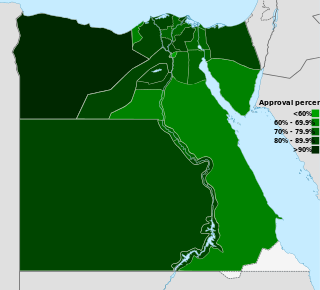
The politics of Egypt is based on republicanism, with a semi-presidential system of government, established following the Egyptian Revolution of 2011, and the resignation of President Hosni Mubarak. The President of Egypt is elected for a maximum of two four-year terms and the Parliament is unicameral and unbiased. The President can appoint up to 5% of the total number of seats in Parliament, and can also dissolve it. Parliament can also impeach the President. Egypt was traditionally ruled by royals until 1952, but the first free elected President was in 2006. The Parliament of Egypt is the oldest legislative chamber in Africa and the Middle East.
There are three types of elections in Denmark: elections to the national parliament, local elections and elections to the European Parliament. Referendums may also be called to consult the Danish citizenry directly on an issue of national concern.

Elections in Portugal gives information on election and election results in Portugal.

Elections in Egypt are held for the President and a unicameral legislature. The President of Egypt is elected for a four-year term by popular vote.

Elections in Guyana take place within the framework of a multi-party representative democracy and a presidential system. The National Assembly is directly elected, with the nominee of the party or alliance that receives the most votes becoming President.

A four-part referendum was held in Russia on 25 April 1993. Voters were asked questions on confidence in President Boris Yeltsin, support for the government's socio-economic policies and early elections for both the presidency and parliament. The referendum was initiated by the Congress of People's Deputies, which stipulated that Yeltsin would need to obtain 50% of the electorate, rather than 50% of valid votes. However, the Constitutional Court ruled that the president required only a simple majority on two issues: confidence in him, and economic and social policy; though he would still need the support of more than half the electorate in order to call new parliamentary and presidential elections.

A referendum on ending apartheid was held in South Africa on 17 March 1992. The referendum was limited to white South African voters, who were asked whether or not they supported the negotiated reforms begun by State President F. W. de Klerk two years earlier, in which he proposed to end the apartheid system that had been implemented since 1948. The result of the election was a large victory for the "yes" side, which ultimately resulted in apartheid being lifted.

The Romanian presidential impeachment referendum of 2007 was conducted in order to determine whether the president of Romania Traian Băsescu should be forced to step down.

The 2005 Egyptian constitutional referendum took place in Egypt on 25 May 2005. The referendum was on a proposed change to the constitution of Egypt which would establish direct elections for the presidency. The opposition parties called for a boycott of the vote, which was passed by a large majority.
The Alliance for European Integration was the centre-right anti-communist ruling coalition in Moldova from the July 2009 election until it lost a no confidence vote on February 13, 2013. It was succeeded by the anti-communist Pro-European Coalition.

The Moldovan referendum of 2010 was a nationwide referendum in Moldova held on 5 September on whether or not the country should amend the Constitution of Moldova to return to direct popular election of the president. Since 2001, the president had been indirectly elected by Parliament, with a supermajority of 61 seats required for election.. The voters are asked to answer the following question "Would you agree with the Constitutional amendment, which would allow the election of the President of the Republic of Moldova by the entire population?", voting for one of the proposed options: “Yes (for)” or “No (against)”. Of those who had cast their vote, 87.83% chose "Yes". However, the referendum did not pass because only 30.29% of voters turned out, short of the necessary 33% for the referendum to be considered valid.

In Yugoslavia, elections were held while it had existed as the Kingdom of Yugoslavia, the first one being in 1918 for the Provisional Popular Legislature of Serbs, Croats and Slovenes and the last being the parliamentary election of 1938. Women were not eligible to vote. After the 1918 indirect ones, the 1920 parliamentary election was the first direct one. Parliamentary elections were held in 1923, 1925 and 1927, while with the new constitution a de facto Lower and Upper House were introduced in 1931. The 1931 elections were not free, as they were handled under a single-course dictatorship, while the 1935 and 1938 were held under limited basic democratic principles.

A referendum on electoral reform was held in Egypt on 12 February 1987. The reform would set aside 48 seats for independent candidates at elections. The change in the law had been hastily adopted in December 1986 in order to pre-empt the Constitutional Court ruling that the 1984 elections had been unconstitutional as they had not allowed independent candidates to stand. The changes were approved by 88.9% of voters, leading to the early dissolution of the People's Assembly and early elections in April.
Early parliamentary elections were held in Egypt on 29 November 1990, with a second round for 261 seats on 6 December. They followed a referendum in October on the early dissolution of Parliament due to issues surrounding the legality of the 1987 elections. However, the elections were boycotted by the Socialist Labour Party (SLP), the Liberal Socialists Party (LSP) and the New Wafd Party, which claimed that the reformed Electoral Law would fail to ensure free elections.

A parliamentary election to the People's Assembly of Egypt was held from 28 November 2011 to 11 January 2012, following the revolution that ousted President Hosni Mubarak, after which the Supreme Council of the Armed Forces (SCAF) dissolved the parliament of Egypt. However the dissolution was ruled unconstitutional and Parliament was reinstated. Originally, the elections had been scheduled to be held in September 2011, but was postponed amid concerns that established parties would gain undue advantage.

A constitutional referendum was held in Egypt on 19 March 2011, following the 2011 Egyptian revolution. More than 14 million (77%) were in favour, while around 4 million (23%) opposed the changes; 41% of 45 million eligible voters turned out to vote.
A committee formed in February 2011 by the Egyptian military following suspension of the constitution during the 2011 Egyptian revolution. The committee's purpose is to review the constitution of Egypt, to be ratified by a referendum.
Following the 2011 Egyptian revolution, the Muslim Brotherhood in Egypt became one of the main forces contending for political power in Egypt against the Supreme Council of the Armed Forces (SCAF) and other established centers of the former Hosni Mubarak regime.

A constitutional referendum was held in Egypt in two rounds on 15 and 22 December 2012. Egyptians living abroad were scheduled to vote between 8 and 11 December. Voting for expatriates had been delayed until 12 December 2012 and was extended until 17 December 2012. Voters were asked whether they approve of the draft constitution that was approved by the Constituent Assembly on 30 November 2012.

The European Union Referendum Act 2015(c. 36) is an Act of the Parliament of the United Kingdom that made legal provision for a pre-legislative advisory referendum to be held in the United Kingdom and Gibraltar, on whether it should remain a member state of the European Union or leave it. The bill was introduced to the House of Commons by Philip Hammond, Foreign Secretary on 28 May 2015. Two weeks later, the second reading of the Act was supported by MPs from all parties expect the SNP; the Act subsequently passed on its third reading in the Commons on 7 September 2015 and was approved by the House of Lords on 14 December 2015, and given Royal Assent on 17 December 2015 and came partly into force on the same day and came into full legal force on 1 February 2016.













